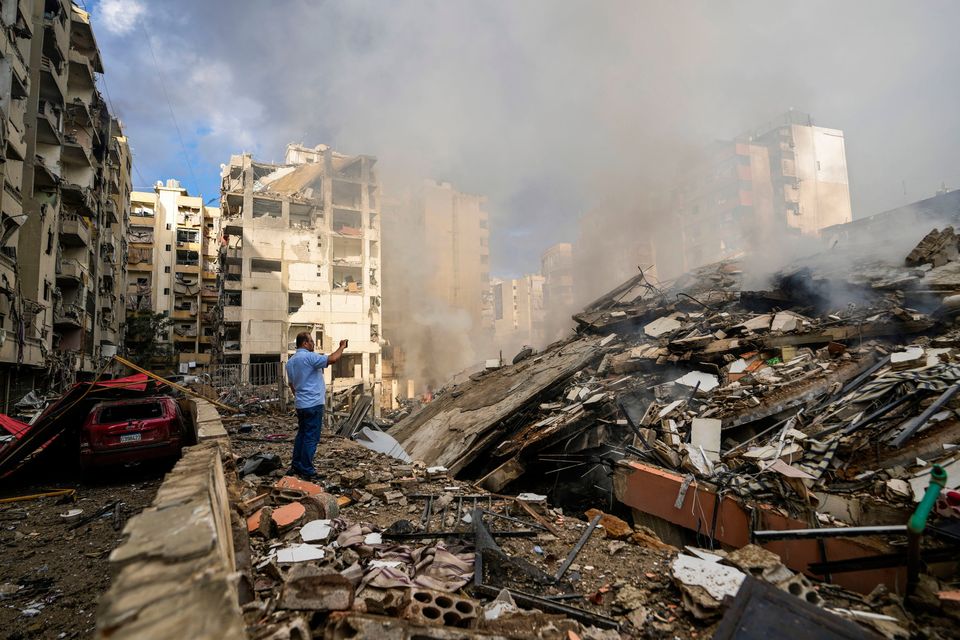A 13-year-old British-Lebanese boy who was rushed home from Beirut on Saturday after cutting short a holiday has described seeing rockets land around him on his way to the airport.
Ali, who did not give his surname, said he “couldn’t sleep” because the drones were very low, adding: “It was like having a fly in your ear.”
The UK Government has chartered a commercial flight out of the country to help Britons trying to flee the fighting, due to leave on Wednesday, amid advice to get out on the next available flight.
It comes as Israel began what it called a “limited, localised and targeted” ground operation in Lebanon after days of strikes targeting militant group Hezbollah.
And Iran on Tuesday launched missile strikes on Israel.
Britons have been scrambling to leave the country as the conflict escalates, some of whom have criticised the Government’s response.
Speaking as he waited at Heathrow Airport on Tuesday for his 19-year-old sister and grandmother, who is in her 90s, while they were on a flight from Beirut, he said: “I was at risk of losing my life. There were rockets left, right and centre.
“Little children were scared, but I was OK. It’s sad to see my country like this.”
Read more
In a video filmed by the teenager as he made his way to Beirut Airport on Saturday, thick plumes of smoke could be seen rising into the air over the city.
His sister Lara, speaking after being reunited at Heathrow, said the journey out had been “terrifying”.
“I didn’t know if I was going to make it,” she said.
“People in Lebanon have said goodbye to me in a way they shouldn’t. Like they will never see me again.
“Whenever I hear a bang I think it’s a missile coming towards me.”
Asked if the Foreign Office was doing enough, she said: “No, it’s disgusting.”
A “panicked” son was among those saying he had been “infuriated” by the response of ministers, saying that they had not done enough to help non-British family members.
Philip (28) said his Lebanese mother Rita (55) arrived in Ajaltoun, Keserwan, north of Beirut in August to visit her uncle who has cancer.
She has a commercial flight booked out of the country on Wednesday, but her son fears a dangerous journey to the airport amid airstrikes.
“We’re panicking about how she’s going to get to the airport,” he said.
“Instead of being in some form of evacuation protected by the British, she instead has to get a taxi, go through the southern suburb of Beirut which is arguably one of the most dangerous places on Earth, and get to the airport all on her own.
“God forbid something happens like a bombing at the airport – it’s just very, very stressful.”
A man documents the damaged buildings at the site of an Israeli airstrike in Beirut on Tuesday. Pic: AP
Rita, who lives in Surbiton, southwest London, has a biometric residence permit but is not eligible for the UK Government’s evacuation plan as she is not a British citizen.
As a British citizen himself, Philip said the Foreign, Commonwealth and Development Office (FCDO) told him she would have been eligible as a family member being evacuated alongside him if he had been in the country with her – but as she is there alone she is not.
He said: “What’s really infuriating is when the British Government come out with a statement saying you need to leave Lebanon immediately and the first question that comes to mind is ‘how exactly?”’
“We pre-booked a flight for her out of the country on October 2, that was her original flight back that she was always going to take to come to the UK, so we were one of the lucky ones that had a return ticket to London that’s valid.
“If I had not booked that flight for October 2 months and months ago, she would be genuinely stuck in Lebanon.”
Announcing the chartered flight for British nationals, Foreign Secretary David Lammy said: “The situation in Lebanon is volatile and has potential to deteriorate quickly.
“The safety of British nationals in Lebanon continues to be our utmost priority.
“That’s why the UK government is chartering a flight to help those wanting to leave. It is vital that you leave now as further evacuation may not be guaranteed.”
British nationals and their spouses, partners and children under 18 are eligible for the flight, and those who are vulnerable will be prioritised. There are 5,000 British single and dual nationals in Lebanon, including members of their immediate families, and the government said it was working on “all contingency options”.
Any further flights in the coming days will depend on demand and the security situation on the ground, the Foreign Office said.
